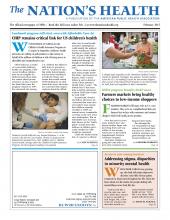A new study finds that when young people binge drink alcohol, it disrupts their immune system — and that disruption happens more quickly than drinkers might think.
Published in December in Alcohol, the study found that within just two hours of young, healthy adults drinking up to five shots of vodka, their immune systems were less active than when sober. The findings are particularly relevant as binge drinking increases the risk of a number of injuries that might land young people in the emergency room, where physicians could benefit from knowing that a patient’s immune system may be impaired due to too much alcohol. Majid Afshar, MD, MSCR, the study’s lead author and an assistant professor within the Loyola University Chicago Departments of Medicine and Public Health Sciences, said the findings illustrate the importance of asking about a patient’s alcohol consumption. He added that some patients are likely arriving at trauma centers with alcohol-related injuries at a time when their healing capacity is weakened.
“This supports the idea that physicians should be aware of these patients and be more aggressive in how they treat them,” Afshar said.
To conduct the study, researchers recruited eight women and seven men, with an average age of 27, who each drank enough vodka shots to meet the definition of binge drinking, which was defined as reaching or exceeding the legal blood alcohol limit for driving. Study participants’ blood was collected and tested before drinking as well as 20 minutes, two hours and five hours after peak intoxication. The study found that 20 minutes after peak intoxication, participants’ immune systems exhibited increased activity; however, at the two- and five-hour marks, their immune systems exhibited decreased activity. The study found that such effects happen after just one episode of binge drinking.
“The clinical impacts of these changes are not yet known but occurred during the post-alcohol ingestion time frame when trauma victims are exposed to (internal) activators of inflammation and microbial pathogens,” the study concluded.
Afshar said that while he and his colleagues expected some type of immune system disruption, they were surprised that it occurred so quickly. From a public health perspective, he said the study’s findings are another reason to support alcohol-related education and prevention efforts.
“The idea that one single episode of binge drinking can cause such a significant disruption — it’s something we can take to the public and show them that there are harms even for those who don’t consider themselves problem drinkers,” Afshar told The Nation’s Health. “We need to do a better job on educating the public about the harmful effects of heavy drinking in people who otherwise consider themselves healthy.”
According to the Centers for Disease Control and Prevention, one in six U.S. adults binge drinks about four times a month and consumes about eight drinks per episode. Binge drinking is more common among adults ages 18 to 34, with more than half of the alcohol consumed in the U.S. drunk in the form of binge drinking.
For more information, visit www.alcoholjournal.org/article/S0741-8329%2814%2920186-8/abstract.
- Copyright The Nation’s Health, American Public Health Association









